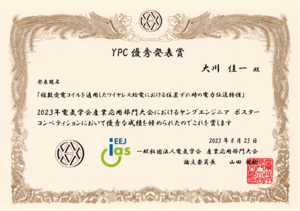Shinagawa Etchujima Campus Graduate School of Marine Science and Technology
Graduate School of Marine Science and Technology
The Graduate School of Marine Science and Technology has a doctoral course divided into a master's course and a doctoral course, and trains independent highly specialized professionals who open up cutting-edge fields.Furthermore, in collaboration with the Japan Fisheries Research and Education Agency, the Japan Agency for Marine-Earth Science and Technology, and the National Institute of Maritime, Port and Aviation Technology, we will further enhance education and research and improve the quality of graduate students. We are trying to
-

-
School of Marine Life ScienceShinagawa Campus
- Department of Marine Biological Resources
- Department of Food Production Science
- Department of Ocean Policy and Culture
-

-
School of Marine TechnologyEtchujima Campus
- Undergraduate Course of Maritime Systems Engineering
- Undergraduate Course of Marine Electronics and Mechanical Engineering
- Undergraduate Course of Logistics and Information Engineering
-

-
Faculty of Marine Resources and EnvironmentShinagawa Campus
- Department of Marine Environmental Science
- Department of Marine Resources and Energy
[Awards and Commendations] Keiichi Okawa (1st year master's student) received the Excellent Presentation Award at the Industrial Applications Division Conference of the Institute of Electrical Engineers of Japan.
The IEEJ Industrial Application Division Conference was held at Nagoya Institute of Technology from August 2023nd to 8th, 22, and Keiichi Okawa, a graduate student at our university, received the Young Engineer Poster Competition (YPC) Excellent Presentation Award. There were 24 poster presentations at YPC, of ??which 139 were recognized with the YPC Excellent Presentation Award.
【Winner】
Keiichi Okawa (1st year master's program, Department of Marine Systems Engineering, Graduate School of Marine Science and Technology)
[Details of award-winning research]
Title: "Power transfer characteristics during positional misalignment in wireless power transfer using multiple receiving coils"
Application of an underwater wireless power supply system is being considered as a method of charging batteries installed in underwater vehicles, but the power supply position of underwater vehicles tends to shift due to the influence of ocean currents, so it is necessary to consider a stable power supply method. be.In this study, we applied multiple receiving coils to a wireless power transfer system with series resonance on the transmitting side and parallel resonance on the receiving side, and investigated the power transfer characteristics when the receiving coils are misaligned.In particular, we evaluated the stability of the power supply voltage by applying multiple receiving coils by conducting a comparative experiment with the case where there is only one receiving coil.
<Related links>
2023 IEEJ Industrial Applications Conference
Institute of Electrical Engineers of Japan





